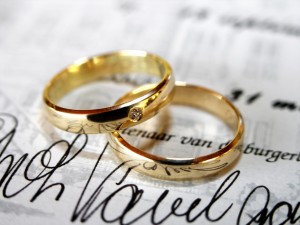 CHICAGO — A federal court has ruled that humanist couples in Indiana can be married by their own ‘secular celebrants,’ something that until now was illegal under state law.
CHICAGO — A federal court has ruled that humanist couples in Indiana can be married by their own ‘secular celebrants,’ something that until now was illegal under state law.
In a unanimous ruling, the Chicago-based 7th U.S. Circuit Court of Appeals said denying humanists the right to be married by celebrants who share their lack of belief in a deity is a denial of their First Amendment rights to freedom of religion.
Under a law dating to the 1850s, Indiana required marriages be conducted by religious clergy or government officials. The humanist plaintiffs argued this denied them the right to be married by celebrants who share their philosophy and gave preferential treatment to religious people.
“The court has gotten this exactly right,” said Reba Boyd Wooden, a humanist and certified “secular celebrant” who was a plaintiff in the case. “Whether a person is atheist, agnostic, humanist, or simply doesn’t want a religious wedding, this decision means they can now have these wonderful occasions solemnized by a celebrant who shares their life-stance.”
Florida, Maine and South Carolina currently allow humanists to officiate at weddings if they become notaries public. The court ruled Indiana must permit the same. There are approximately two dozen certified secular celebrants nationwide.
Writing for the court, Judge Frank Easterbrook said the current law discriminates not just against humanists, but against members of other faith groups that do not include a deity — Buddhists, Jains, Shintos and Taoists.
“It is irrational to allow humanists to solemnize marriages if, and only if, they falsely declare that they are a ‘religion,’” he wrote. “It is absurd to give the Church of Satan, whose high priestess avows that her powers derive from having sex with Satan, and the Universal Life Church, which sells credentials to anyone with a credit card, a preferred position over Buddhists, who emphasize love and peace. … Like many others, humanists want a ceremony that celebrates their values, not the ‘values’ of people who will say or do whatever it takes to jump through some statutory hoop.”
This win for humanists, atheists and other secularists comes after a recent string of losses. In May, the Supreme Court ruled that public meetings could begin with sectarian prayers, and in June it ruled corporations can be granted exemptions from federal law on the basis of their owners’ religious beliefs.
“This is a major victory for all secular Americans, who despite being part of the fastest-growing belief demographic in the United States, still suffer from discrimination and the special privileges accorded religion,” said Ronald A. Lindsay, president and CEO of the Center for Inquiry, a humanist organization that certifies secular celebrants and brought the case.
Marriage laws are being challenged in North Carolina as well, where a group of United Church of Christ clergy is challenging the state’s requirement that marriages can only be performed if a couple has a legal marriage license. Because North Carolina does not permit same-sex “marriages,” any minister solemnizing a same-sex union would be committing a crime. The UCC clergy and others claim that their faith compels them to celebrate same-sex “marriages.”
Christian News Network contributed to this report.
Become a Christian News Network Supporter...


